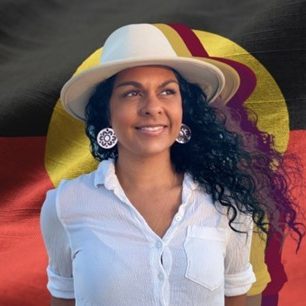
Teela Reid
Juris Doctor, 2015
Teela Reid is a proud Wiradjuri and Wailwan woman, lawyer, activist and storyteller who says her path is eternally guided by the direction of her ancestors. This path has taken Teela on a trail-blazing journey towards advocating for Aboriginal land rights, dismantling systemic racism in Australia, and elevating the voices of First Nations people that is vitally important for all generations.
Teela initially started her career as a teacher, but after being selected as an Australian Youth Delegate to the United Nations (UN) was inspired to make a career change into law so that she could come back home and pursue advocacy for First Nations peoples.
Teela says she saw studying law as her chance to understand and challenge the system that has lawfully disempowered her people and weaponised racism. “I'm the first generation to have access to formal education. I saw studying law as a chance to better understand these systems and empower my people.”
Teela graduated with her Juris Doctor (JD) from UNSW Law & Justice in 2015. “The Juris Doctor is a challenging yet rewarding program that has the potential to change your career and life trajectory. It's such a huge life decision to embark on postgraduate studies, but one that will change your life and open up an expanse of career paths that would have not otherwise been available,” she says.
“I looked for a law school that had an ethos and a philosophy that aligned with my values. I chose to study at UNSW because it genuinely started from a good place at the leadership of Hal Wootten. They also had Indigenous academic support programs and a visible presence of Indigenous students at the law school."
Since graduating, Teela has been appointed Special Counsel - First Nations Justice at the Environmental Defenders Office and is the inaugural Lawyer in Residence at the University of Sydney Law School, where she maintains relationships with international law schools. Teela is also the co-founder of Rebellious Lawyers Australia, which supports the concept of ‘movement lawyering’ – a model through which Australian lawyers can better support movements that address social injustice and systemic change. She has worked as a senior solicitor in Aboriginal Land Rights litigation at Chalk & Behrendt, as a criminal and civil lawyer at Legal Aid NSW and is also the co-founder of Blackfulla Bookclub, a platform and community space that celebrates First Nations stories. Teela was also a working group leader on s 51(xxvi), the Race Power, in the Constitutional dialogue process that culminated in the Uluru Statement from the Heart, which was the catalyst for the historic Indigenous Voice Referendum in 2023. She has been widely recognised for her public advocacy work to end systemic racism, including being named the 2020 UNSW Young Alumni, 2021 Future Shaper by Time Out Sydney, 2022 Voice of Now by Marie Claire and gaining a spot on Marie Claire’s 2023 Power List.
Now that the referendum is over, Teela is determined to use her knowledge and passion to keep advocating for change in Australia to empower and shape First Nations knowledges.
“The question of Australia’s legitimacy remains as a consequence of the nation's failure to recognise Aboriginal and Torres Strait Islander people in the 2023 referendum – we are the only democracy that refuses to recognise its Indigenous peoples. Despite this, we know there is a groundswell of Australians prepared to seek truth and justice, so it is important we maintain the momentum and consolidate the goodwill of many who want to live in a more equal world - this requires reckoning with and respecting the rights of Indigenous peoples consistent with the United Nations Declaration on the Rights of Indigenous Peoples.
My whole upbringing has been defined by the notion of reconciliation. I don’t think this framework is tenable any longer in a nation that is yet to come to terms with the truth of its history, this is evidence by the rejection by Australians at the referendum,” she says.
“I am now focused on how we, as a nation, protect the unique rights and inherent wisdom of First Nations peoples who have cared for this country since time immemorial. All Australians have an obligation to understand the truth of our history and tread lightly on this country; without country, there is no people.”
This article originally appeared in the Koori Mail. Photo credit: Jakayla Reid.
